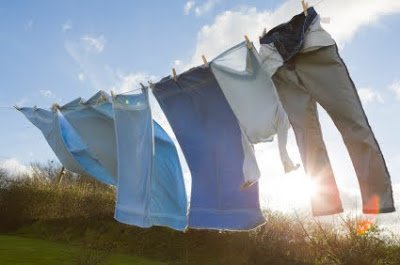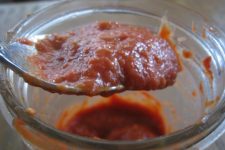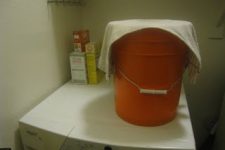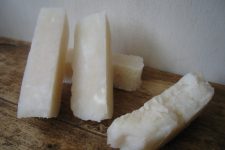I’ll just start off by coming clean (pun intended). I have been making my own laundry soap for a while now, but there have been times in the past when I have caved to the pressure and bought it from the store because commercial laundry detergent just seems to work better.
We can be honest here right? Well, let’s just be honest; until now, I was not totally thrilled with my homemade laundry detergent. Is anyone with me? I mean, I never felt like my clothes where getting clean. In fact, they appeared dingy and stains never really came out in the wash. So I would occasionally purchase and use store bought detergent.
However, I was determined not to give up and I began aggressively looking for a solution to the problem. I am so happy to report to you that my clothes have never been cleaner than they are today; because, here is what I have discovered:
My municipality’s water is extremely hard. Hard water is actually very common throughout the globe. It contains heavy deposits of minerals such as calcium and magnesium. And continuous laundering in hard water can damage clothing fibers and shorten the life of clothes by 40%.
How can you know if you have hard water? Call your water provider and ask. You may also see tell-tell signs such as
•There will be a “ring around your bathtub.”
•Soaps and shampoos do not lather easily.
•A white film will form around faucets and drains.
•Laundry will feel stiff, and may appear dingy.
With this knowledge I was able to combat the problem and I would like to share with you my laundry care routine.
Pre-Treat Stains
Keep a spray bottle full of this Homemade Bleach Alternative ready to saturate stains you can’t get to right away. You may also choose to keep it in a 5-gallon bucket so as to soak already dingy clothing.
Laundry Cycle
Use ½ cup of this Homemade Laundry Soap. If you have hard water, increase the amount of this Homemade Laundry Soap to 1 cup per load. Use this Homemade Bleach Alternative in the bleach compartment of your washer (or for a top loader machine pour 1 cup in with the wash). Fill the fabric softener compartment with white vinegar (or for a top loader machine pour 1 cup in with the wash).
Note: Vinegar neutralizes the effects of hard water by dissolving the minerals.
Tip: In areas with hard water, it is important to limit the amount of time your clothing is exposed to the washer. Therefore, wash clothing on the shortest cycle.
Drying
You guys know I’m a huge fan of line-drying clothing. In fact, exposure to the sun really helps to brighten clothing. If you do not have a clothes line, hang your clothes on hangers somewhere near a window indoors. I’m telling you, it makes a huge difference.
Laundry is an area we all know a lot about! Please leave your comment sharing with us your laundry success stories. That way, we can all learn from each other!





 Autumn Healthful and Healing Recipe: Vitamin Soup
Autumn Healthful and Healing Recipe: Vitamin Soup
We also have very hard water. I haven't tried it yet, but what about powdered Calgon to help with the hard water? I saw this at the store the other day and I am going to add it to mine when I make the powdered version. I am really curious to see how it turns out! 🙂
I have been using homemade laundry soap for about 5 years now, and you are right, the clothes do seem to be a bit dingy. It hasn't bothered me too much because I do tend to pre-treat any serious stains, and the vinegar rinse helps – although I don't do it every load. I typically wash everything but diapers in cold, so I usually fill up a mason jar with the laundry soap and some hot water from the faucet to try and dissolve it a bit before it goes in the washing machine. I found that once I started doing that, it helped a bit.
Thank you for this post! We recently moved and our water is extremely hard, so this will come in very handy for me!
I am having trouble with purchased laundry detergent. It doesn't seem to get our clothes clean. They are advertising more cleaning power, well it's not working, and beside why do we need more cleaning power, that only means more chemicals and more dollars not cleaner clothes. I'm going to try your recipe for laundry detergent. Thanks for the post.
Cathy
Oh my! I thought I was one of the very few who hated the homemade laundry detergent just for those very reasons! Infact my husband had a ft because not only did they never lok really clean but they just didn't smell good, they didn't stink but they just did not smell good and we never looked clean. This also offended my husband because, as provider, he expects us to take care of our things and our clothes just looked awful! I use store bought, now, but find that with our hard water certain detergents just do not work. I am thrilled to see a way to make the homemade detergent work in our hard water!
I guess I'm super lucky- I've been making my own homemade laundry detergent for over a year- and providing to other family members as well- and none of us have had any problems. We love it! In fact, a couple of months ago when someone gave us some store bought detergent to use up for them (they were going away) everyone complained how dingy and perfumey their clothes were! From now on I won't even use "given" store bought laundry detergent. I use Fels Naptha, Borax, and Washing Soda.
We have very hard water. Vinegar is my best friend when trying to chip off the hard water particles on the faucets.
I use Borax, washing soda and ivory soap in my laundry recipe. Recently I doubled the amount and that seems to have taken care of the ‘ding’ in our whites. I agree that line drying helps in whitening. It also oxidizes the clothes and takes the ‘stink’ out.
I want to start line drying my clothes but what do you do when the pollen becomes a problem? My husband is not crazy about line drying because he feels that our clothes won’t be “clean” from dirt and pollen blowing around.
I throw my in the dryer on fluff for 10 minutes to get the pollen and dirt off. We have lots of allergies – this has really helped.
I completely agree with you! A while back I too made the normal recipe for laundry detergent, started using it and yup…. dingy…. very dingy…. I stopped using it and went back to store bought.
My question is… We bought a new washer and dryer and of course the first thing they tell us is to buy high energy efficient detergent. I was wondering how homemade detergent would work with this kind of washer?? I guess I am more afraid of it damaging the washing machine.. Lets face it this ones gotta last me a long long long time….
Yes, I too am very interested in making my own laundry soap, if for no other reason than to stop adding all the containers to the land fills. But, the question still remains about how it would work in a high-efficiency washer. Those things are too expensive to try something carelessly. Help?
Thank you for sharing how to stop our clothes from being dingy when using DIY clothes detergent. Our water is hard so when washing the white clothes the stains don’t remove and the dark clothes are dingy. I am looking forward to trying your suggestion so I can continue washing my clothes with my DIY detergent.
Hi! I have tried at least 5 different times to make this soap and have varied every ingredient and still cannot find a way to make it not cake. My detergent (washing soda, fels naptha, borax and boiling water etc..) doesn’t ever get, but cakes it looks like a science project gone awry. We do have extremely hard water here, so i’ve tried adding vinegar and more bar soap i’ve tried changing the length of boiling time and order of ingredients added. But, I seem to need some help. Any suggestions? thanks!
I’ve heard you need to use distilled water to make the gel or liquid soap.
Does anyone know the weight in grams of a Tablespoon of the finished Powdered Laundry Soap, using Fels, Washing soda and Borax and the ounces per load that are used for the liquid Laundry Soap? It would be a great help if anyone that has the Powdered Laundry Soap can weigh ia Tablespoon for me.
Thanks
Jaime in Medellin, Colombia
[email protected]
I used the liquid recipe and my clothes came out with grease like stains on them. What did I do wrong?
We have really hard water here as well and I’ve found that cleaning the washer on a regular basis (about every 3 months) is a good idea as well. Don’t hate me, but I use bleach and fill the washer to the highest level with hot water…let agitate a few minutes then open the lid and let sit. After an hour, let the washer complete the cycle and then repeat the process with white vinegar. You might need to scrub a tiny bit, but it comes clean rather easily using this method.
We’ve also cut back on the amount of white clothes we buy because whites are the hardest to keep that way. We’ve shifted to gray socks and hubby is transitioning to gray undershirts as well. (that’s also one less load I have to sort out)
Hi, Rebeca- The solution for me was baking soda. Our hard mountain water needs a half cup for
each large load, dissolved in hot water first if you are washing in cold water. You may need as much as a cup given your very hard water. Many clothes become dingy just from detergent build up-just wash with the baking soda on a long cycle, and you will see soap bubbles coming out of everything for as month or longer. Clothes will not smell, because the soda neutralizes odours. To brighten clothes further, a small amount of borax and/or washing soda will help-dissolve first in hot water. Washing soda is just baking soda baked in an oven at 400 Fahrenheit until it is dry, clumpy, and rough feeling. It is caustic with a ph of 11, so use gloves when working with it, keep it away from little ones, and use in small amounts-I use 1/4 cup to a large load. For tough stains, I simply rub the wetted area with a bar of Fels Naptha, which removes everything! This approach also helps to diminish allergy symtoms for those with sensitive sun. I hope this helps. Blessings, Gabrielle
Hi, Rebeca- I can’t vouch for my typing-I meant sensitive skin! Although these many recipes on the blog are well intended, people may be wasting money on things they do not need to have clean laundry. As an R.N. with a busy massage practice for 20 years, I’ve only used baking soda and occasional washing soda and borax for truly dirty laundry-like muslin garden row covers at the end of winter. I’ve always had excellent results, with clean, soft sheets for my patients, and the same for my families’ clothing and bath linens. Blessings, Gabrielle
Is this recipe cloth diaper friendly?
my DH has noticed a difference in his clothes…ESPECIALLY his white under shirts. i use bleach on those because theyre cotton but for stuff like his white poly blend running shirts i cant because i fear ruining his shirts and i was about to give up until i read this. all the symptoms you listed were EXACTLY what we have. problem is that we live in an apartment and we have no control over the water used for the communal washing machines. i will try the powdered calgon and hope for the best! =)
Everyone making home-made laundry detergent … might I perhaps suggest a sink experiment (one which helped me discern that castile soap, in my house, works the best and leaves clothes very white. Socks … experiment with socks in the sink, to find your best formula; I attempted to use commercial products (worked okay as usual), and then combined commercial with castile soap (worked better) and then finally used my old recipe of vinegar and baking soda and castile soap (best) or commercial detergents (just one slot under best). As everyone knows, the harder the water the more difficult the conditions are for soap (not so much for commercial chemical detergents). The soap binds (reacts) with the hard water minerals + compounds … poof, soap scum and dingy results. Still just as clean as found with commercial detergents, but more scummy because of soap’s + reaction. Go figure; we equate soap scum with dirt, when it’s just a reaction (soap + minerals). That’s all – bon chance, and remember, large companies love to claim their chemicals clean better than classic products! Okay, maybe battery acid does clean clothing better, but … the results are kind of itchy.
I realize this is such an old post, but, Soap Scum, your post made me laugh; loving the last sentence.
FYI – The link to your home made bleach alternative is broken.
Is there anything wrong with getting a water softener? It is the hard water that causes most of the problems when clothing is dingy and dull. You can have a water softener that feeds the laundry and the bathrooms so showers and toilets aren’t a problem to keep clean, but it bypasses the kitchen and outside spigots so the drinking and garden water is not altered.
I’ve been using homemade detergent for a couple of years now, and agree that some recipes aren’t great. The clothes were clean, because they had been washed, but without the “optical brighteners” of commercial powder, or the chemical cocktail of scent from fabric softener, they just didn’t seem right! I now use a powdered detergent recipe, using 1 bar shredded soap,1 cup washing soda, and 1/2 cup borax. I can honestly say it does just as good a job as any commercial “natural/eco” washing powder I have tried, without the eco price tag! The borax isn’t easy to get where I live, so it’s expensive, but it has made all the difference to my washing – without borax it didn’t really work. I have just made my own laundry soap bars (using lard and lye), which was very easy and cheap, and hopefully will make a better laundry detergent than the stuff I currently use, and it can also be used as a pre-treater-stain bar.
I still use a very small amount of fabric conditioner, and add a good splosh of white vinegar to the rinse – this seems to get extra suds and grease out without affecting the smell.